Maurice Greenberg: Changes came quickly with right leadership and vision
One day in the fall of 1989, Maurice Greenberg, godfather of international insurance, and Henry Kissinger, former U.S. Secretary of State, had a meeting with then Shanghai mayor Zhu Rongji in a hotel in Shanghai’s Puxi area. Looking outside the window, Zhu Rongji pointed to Pudong, which was a field at that time, and told his foreign guests: I feel in maybe two or three years, there will be a city here. “I thought he was kidding,” said Mr. Greenberg, who realized later that Zhu was right. “With the right leadership and a lot of vision, changes came very quickly.”
The same year, Mr. Greenberg was invited by Zhu Rongji to serve as chairman of the International Business Leaders Advisory Council for the Mayor of Shanghai (IBLAC). Today, 29 years later, at the headquarters of C.V. Starr & Co., Inc. in Manhattan, Mr. Greenberg recalled his Shanghai stories. In his nineties, the veteran who participated in the Normandy landing is still full of spirit.
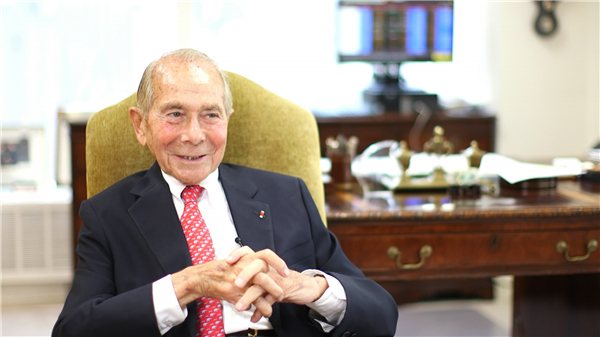
(As former Chairman of AIG, Mr. Greenberg currently sits as Chairman and CEO of C.V. Starr & Co., Inc.)
Contributions to IBLAC
On October 9, 1989, the first IBLAC (also known as the preparatory meeting) was held at the Xijiao State Guest Hotel in Shanghai. At that time, Shanghai was at the initial level of economic development. Under the pressure of building a world-class city, it was faced with challenges from both domestic and international markets. A lot of reforms needed to be carried out and there was no international precedent for IBLAC. But Shanghai has always been a trail blazer. Following the advice of Jing Shuping, chairman of China International Economic Consultants, Zhu Rongji, then mayor of Shanghai, managed to invite 12 internationally renowned business executives to serve as consultants for Shanghai’s future development. Aside from Mr. Greenberg, representatives from Fiat and Continental Grain Company were also on the guest list.
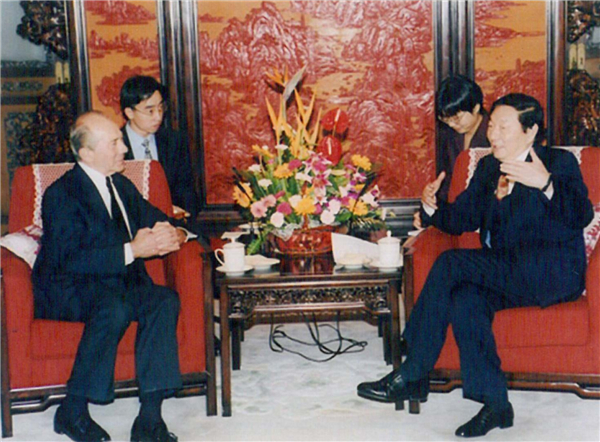
(Maurice Greenberg and Zhu Rongji. Photo provided by Starr Companies)
Looking back to the first council, we can still feel China’s willingness to open to the outside world and listen to helpful suggestions. As Mr. Greenberg put it, “The council was very important. Zhu Rongji wanted to bring more foreign companies to Shanghai, to develop Shanghai faster. There was no problem getting members to join. They had a strong interest in Shanghai. And particularly, when Zhu Rongji was the mayor, his vision was very important.”
Since 1989, IBLAC has been held annually, generally in autumn. A total of 39 members from 16 countries around the world and 7 honorary members attended the 2017 session. With different industry backgrounds, they have offered many development insights to the Shanghai government.
Mr. Greenberg himself is a frequent attendee of IBLAC, having put forward many constructive suggestions. For instance, in 2008, as the world was swept by the financial crisis, his speech at the IBLAC pointed out a direction for Shanghai: Liberalizing currency control can help Shanghai become a real international financial center, but now is not the best time. Shanghai should not be hasty. An international financial centre requires free flows of capital and free currency exchanges. A truly international financial center cannot flourish if there is control on currency exchanges.
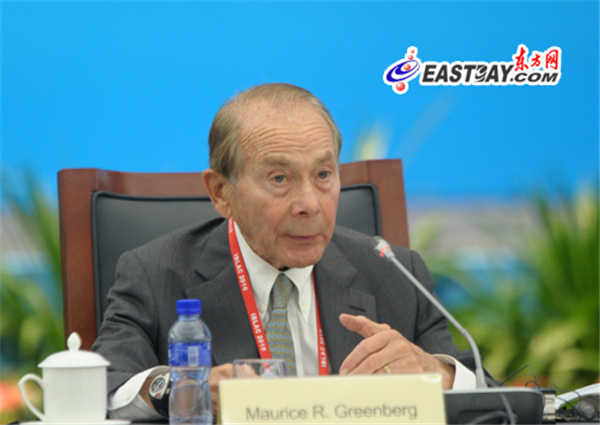
(Mr. Greenberg delivered a speech at the 22nd IBLAC on October 10, 2010.)
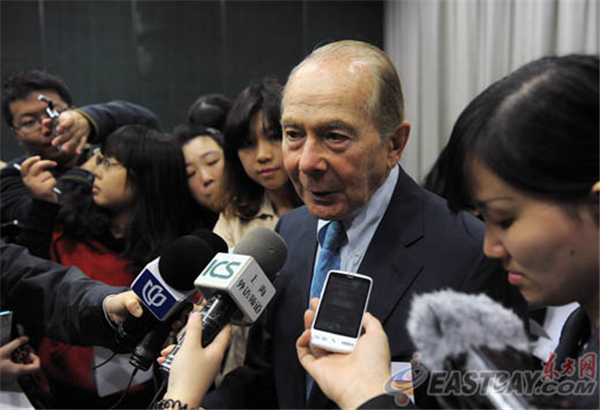
(Mr. Greenberg was interviews by the media while attending the 23rd IBLAC in 2011.)
Consisting of 500 people, 60% of whom are foreigners, IBLAC is like a think tank. It has been chaired by many entrepreneurs from Mr. Greenberg to Mark Weinberger (Chairman and CEO of EY), and many of its members are managers from the world’s top 500 companies. All of them have come to Shanghai to contribute wisdom to the city’s development.
The changes in IBLAC’s topics over the years are the epitome of Shanghai’s development. 30 years and 36 topics: from Pudong’s development and opening up to the entry into WTO; from urban planning to the reform of state-owned enterprises; from addressing the challenges of the international financial crisis to Shanghai’s all-round reform and opening up in the new era. They reflect Shanghai's trajectory of transformation, from a traditional industrial and commercial city to a multi-function city.
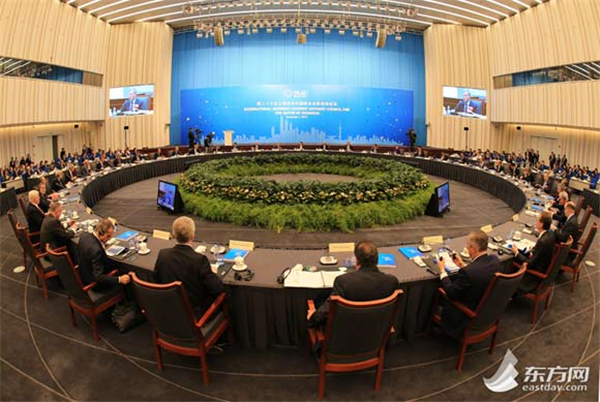
(Business executives from all over the world at the 25th IBLAC)
The change in the form of the council also proves Shanghai’s open attitude while communicating with the world. In the past, IBLAC was mainly presented through the speeches of experts. Starting from the 15th IBLAC, group discussion was adopted and carried out, when the mayor, deputy mayor and business executives sat together to offer insights.
Belief in China’s change
After the first IBLAC, the friendship between Mr. Greenberg and Zhu Rongji still lasts. Greenberg is very appreciative of Zhu’s vision and leadership, which enabled Shanghai's rapid development. Later, when Zhu served as the Premier of the State Council, in order to help China enter the World Trade Organization (WTO), Mr. Greenberg was busy going between Washington and Beijing to persuade the U.S. government to grant China permanent MFN status. He said China, one of the largest countries in the world, should not be out with the WTO. It is natural for China to enter the WTO and Chinese people deserve that support.
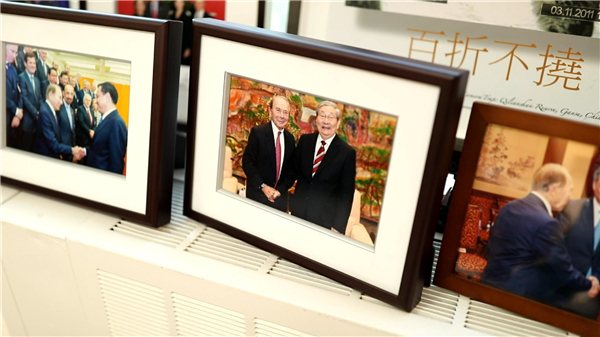
(In his office, Mr. Greenberg keeps photos of him standing with Zhu Rongji and many other Chinese leaders.)
Actually, the history between Mr. Greenberg and China dates back prior to the first IBLAC convention. According to him, as early as 1975, he led an AIG team to Beijing to sign an agreement with the People’s Insurance Company of China (PICC)— the first insurance company after the PRC was founded — hence becoming the first U.S. insurance firm to cooperate with China. Since then, he has been to China at least once a year.
When it comes to Shanghai, Mr. Greenberg regards it as his second home. Starr was founded in 1919 by Cornelius Vander Starr in Shanghai, and AIG was formed initially as a Starr subsidiary in 1968, so Shanghai means a lot for Mr. Greenberg. He said, “In 1992, AIG established the Shanghai branch of American International Assurance Company Ltd. (AIA) and we got the first life insurance license granted to foreign companies by China thanks to more than 20 years of effort.” Since entering the Chinese market, AIG has been committed to achieving a win-win situation in the industry. At first, because Chinese insurance companies lacked industry expertise, organizations under Mr. Greenberg’s leadership provided training for Chinese companies, teaching them advanced business concepts and underwriting experience, thus playing an indelible role in the enlightenment of the Chinese insurance market.
While promoting the development of China’s life insurance industry, Mr. Greenberg introduced into China an advanced sales model when AIA first introduced a life insurance agent system into the Shanghai market. Since 1992, the insurance agent system has been decisive in the development of China’s insurance industry, especially in the rapid growth of life insurance, because the existence of insurance agents has to some extent accelerated the institutional reform of China’s insurance companies.
Thanks to Mr. Greenberg’s support, Shanghai has also attracted a large amount of foreign investment. The AIA Building at No. 17, East No.1 Zhongshan Road, and the Shanghai Mall at the heart of Jing’an District stand testament to this.
Mr. Greenberg, having been in the insurance and finance industry for 58 years, has deep insights into China’s economy. He has never given up on China’s ability to change, even in 1975 when he first came to China. At that point, China was still a closed country, but he strongly believed, “China will one day be part of the world trading system. You can’t keep a country as big as China locked up forever ... I believe that one day there will be a change.” Three decades afterwards, he has seen gargantuan changes and is ever more confident in China, “Today China is the second largest economy in the world, and with 1.4 billion people, it could be NO.1. The numbers speak for themselves.”
The outspoken man also pointed out that the pace of China’s change must be accelerated: “China has to open its markets to foreign companies. There has to be equality. It is not as if China is 25 years ago. I hope that will happen sooner rather than later.” To conclude the interview, facing the current Sino-US relations, he voiced his expectation for the current generation of Chinese youths, “They need change that will be beneficial to China and its trading partners.”
(Special thanks to SinoVision for helping with the video interview.)
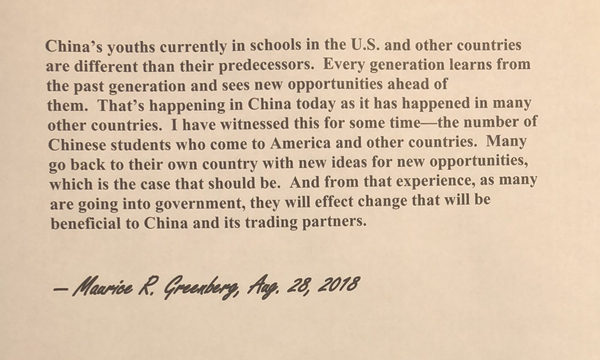
(Mr. Greenberg's wishes for Chinese youth)
